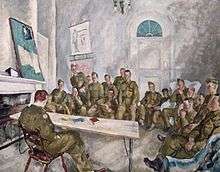Steven Spurrier (artist)
Steven Spurrier RA (13 July 1878 – 11 March 1961) was a British artist and painter. His work was part of the painting event in the art competition at the 1928 Summer Olympics.[1]
Steven Spurrier | |
|---|---|
| Born | Steven Spurrier 13 July 1878 London |
| Died | 11 March 1961 (aged 82) St John's Wood, London |
| Nationality | British |
| Education |
|
| Known for | Painting |
Biography

Spurrier was born in London and from the age of seventeen served an apprenticeship to his silversmith father. Spurrier also studied art at evening classes at Heatherley's School of Art and then at the Gilbert Garrett School. In 1900, Spurrier gave up silverwork and became a freelance magazine illustrator. His work appeared in magazines such as Madame, Black and White, The Graphic, Illustrated London News, The Windsor Magazine and the Radio Times.[2][3]
During the First World War, he worked with the Admiralty developing dazzle camouflage for ships. During World War Two, in March 1944, the War Artists' Advisory Committee offered Spurrier a commission of 50 guineas to paint a picture of an Army discussion group.[4] Spurrier exhibited at the Royal Academy from 1913, was made an associate member in 1945 and became a full member of the Academy in 1952.[2]
Spurrier also produced posters for theatrical productions and illustrated books. His illustrations for Swallows and Amazons, the first book in the children's series by Arthur Ransome, were disliked by Ransome and were not used except for the dust jacket and map.[5] Later editions had illustrations by Clifford Webb and then by Ransome himself.
Spurrier died in London in 1961. He had married Gertrude Stocks in 1904; their elder son, Christopher F. Spurrier (b. 1911) was an airline executive, including as manager of British West Indian Airways at Barbados;[6][7] their younger son, John Benison Spurrier[8] (b. 1914; known as "John Benison") was a designer and artist.[9][10]
Publications
- Black and White (1909)
- Illustration in Wash and Line (1933)
References
- "Steven Spurrier". Olympedia. Retrieved 26 July 2020.
- Tate. "Artist biography Steven Spurrier 1878—1961". Tate. Retrieved 1 November 2013.
- Stephen Adams (Arts Correspondent) (12 May 2008). "Steven Spurrier art rescued from rats". The Telegraph. Retrieved 1 November 2013.
- Imperial War Museum. "War artists archive - Steven Spurrier". Imperial War Museum. Retrieved 4 February 2016.
- The Bank Mill Project (2010). "The Cowan Artists of 1944". The Bank Mill Project. Retrieved 1 November 2013.
- Who's Who, Jamaica and British West Indies, Who's Who (Jamaica) Ltd, 1960, p. 451
- Personalities in the Caribbean, vol. 2, Personalities Ltd, 1965, p. 121
- http://www.artnet.com/artists/steven-spurrier/gertrude-christopher-and-benison-the-artists-OoQlzucxxOY8rlLPJvf5ww2
- Who's Who in Art, nineteenth edition, The Art Trade Press, 1980, p. 34
- Liss Fine Art. "Artist biography Steven Spurrier". Liss Fine Art. Retrieved 1 November 2013.
Further reading
- Who was Who, 1961-1970 (1972, A & C Black, London)